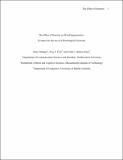The Effect of Sonority on Word Segmentation: Evidence for the Use of a Phonological Universal
Author(s)
Ettlinger, Marc; Finn, Amy Sue; Hudson Kam, Carla L.
DownloadFinn_Effect on Sonority.pdf (550.8Kb)
PUBLISHER_POLICY
Publisher Policy
Article is made available in accordance with the publisher's policy and may be subject to US copyright law. Please refer to the publisher's site for terms of use.
Terms of use
Metadata
Show full item recordAbstract
It has been well documented how language-specific cues may be used for word segmentation. Here, we investigate what role a language-independent phonological universal, the sonority sequencing principle (SSP), may also play. Participants were presented with an unsegmented speech stream with non-English word onsets that juxtaposed adherence to the SSP with transitional probabilities. Participants favored using the SSP in assessing word-hood, suggesting that the SSP represents a potentially powerful cue for word segmentation. To ensure the SSP influenced the segmentation process (i.e., during learning), we presented two additional groups of participants with either (a) no exposure to the stimuli prior to testing or (b) the same stimuli with pauses marking word breaks. The SSP did not influence test performance in either case, suggesting that the SSP is important for word segmentation during the learning process itself. Moreover, the fact that SSP-independent segmentation of the stimulus occurred (in the latter control condition) suggests that universals are best understood as biases rather than immutable constraints on learning.
Date issued
2012-05Department
Massachusetts Institute of Technology. Department of Brain and Cognitive Sciences; McGovern Institute for Brain Research at MITJournal
Cognitive Science
Publisher
John Wiley & Sons, Inc
Citation
Ettlinger, Marc, Amy S. Finn, and Carla L. Hudson Kam. “The Effect of Sonority on Word Segmentation: Evidence for the Use of a Phonological Universal.” Cognitive Science 36, no. 4 (May 2012): 655–673.
Version: Author's final manuscript
ISSN
03640213